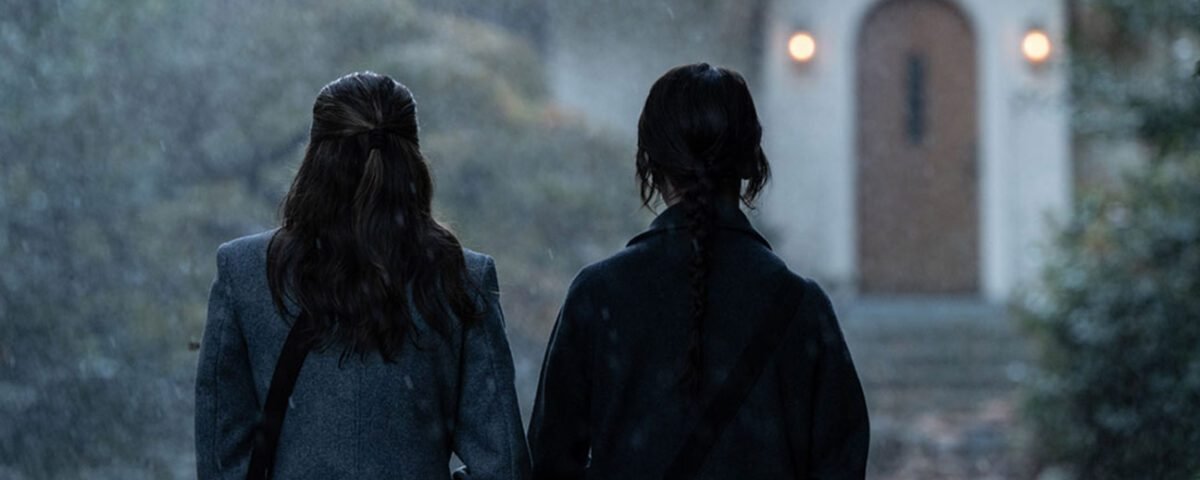


‘Daniela Forever’ Review: Henry Golding and Beatrice Grannò Are Underserved in Nacho Vigalondo’s Scattered Sci-Fi Drama
September 20, 2024


‘Riff Raff’ Review: Jennifer Coolidge, Bill Murray and Ed Harris Labor Over a Crime Comedy That Doesn’t Deserve Them
September 21, 2024Two Mormon evangelists are tasked with converting a reclusive older man in ‘A Quiet Place’ duo Scott Beck and Bryan Woods’ feature co-starring Sophie Thatcher and Chloe East.
Heretic
A great Grant makes it work.
The most compelling moments in Scott Beck and Bryan Woods’ mostly sharp religious horror Heretic involve Mr. Reed, a cerebral theologian played with reptilian persuasiveness by Hugh Grant, intellectually sparring with two young Mormon evangelists. Grant, whose eager eyes and puckish smile wooed Renée Zellweger’s Bridget Jones and Julia Roberts’ Anna Scott (Notting Hill), uses his signature charm here to test the bounds of these junior missionaries’ beliefs. He imbues his character, a sinister recluse, with a well-intentioned disposition that soon reveals itself to be an unsettling trap. Heretic, which premiered at the Toronto International Film Festival before it hits theaters November 15, sells Grant as a convincing villain and makes you wonder why he hasn’t played more of them.
But Mr. Reed is different. He invites Sisters Paxton and Barnes to come inside, assures them that his wife is home (Mormon women can’t be alone with a man, they say) and even offers them blueberry pie. Never mind that his movements suggest some malevolence, that he can’t stop staring at a surgical mark on Sister Barnes’ arm or that his questions edge into more personal territory. So rare is his attentiveness to faith — he takes out his own annotated copy of the Mormon bible — that Sisters Paxton and Barnes decide to disregard their anxieties. That, of course, is a mistake.
The hostility of the space becomes more apparent the longer Sisters Paxton and Barnes chat with Mr. Reed. His enthusiasm verges on pushy, a sign that alerts Barnes, especially, to the danger of the situation. By the time the women realize they are in peril — the doors won’t open, the pie doesn’t exist — it is too late. Mr. Reed reveals himself to be a kind of religion obsessive, a self-taught scholar of faith and belief. His studies have led him to some disturbing conclusions, which he maps out for Paxton and Barnes in one of Heretic’s most fun and distinctive scenes. All that can be said is that it involves Monopoly, Jar Jar Binks, Radiohead and the Hollies.
Grant delivers his verbose musings with the composure of a professor and the velocity of a fanatic. He paces around the back room, where he has corralled his guests, and unveils props to support his points. Chung uses overhead shots to capture Mr. Reed’s desktop — a neatly organized tableau of religious texts and versions of the Monopoly board game — which recalls a Renaissance triptych.
Heretic is quite compelling in these early moments, which include Paxton and Barnes’ entrance as well as Mr. Reed’s presentation. East and Thatcher’s performances play a big role in keeping us hooked. If Grant is the wily villain, these actresses are the savvy horror protagonists worth rooting for. A gripping transition occurs as Mr. Reed intellectually ambushes these women, whose faith gets tested in the most extreme manner. East’s Sister Barnes pulls us in first with her shrewd observations and fearless reproach of Mr. Reed’s logic. But soon we’re watching Thatcher, who smartly leverages Paxton’s perceived naivety throughout the film.
The relationship between Paxton, Barnes and Mr. Reed remains the most absorbing thread throughout Heretic. Even when the screenplay heads into deflating territory — trading potential acerbity for more neutral conclusions — their cat-and-mouse game keeps us curious and faithful.





